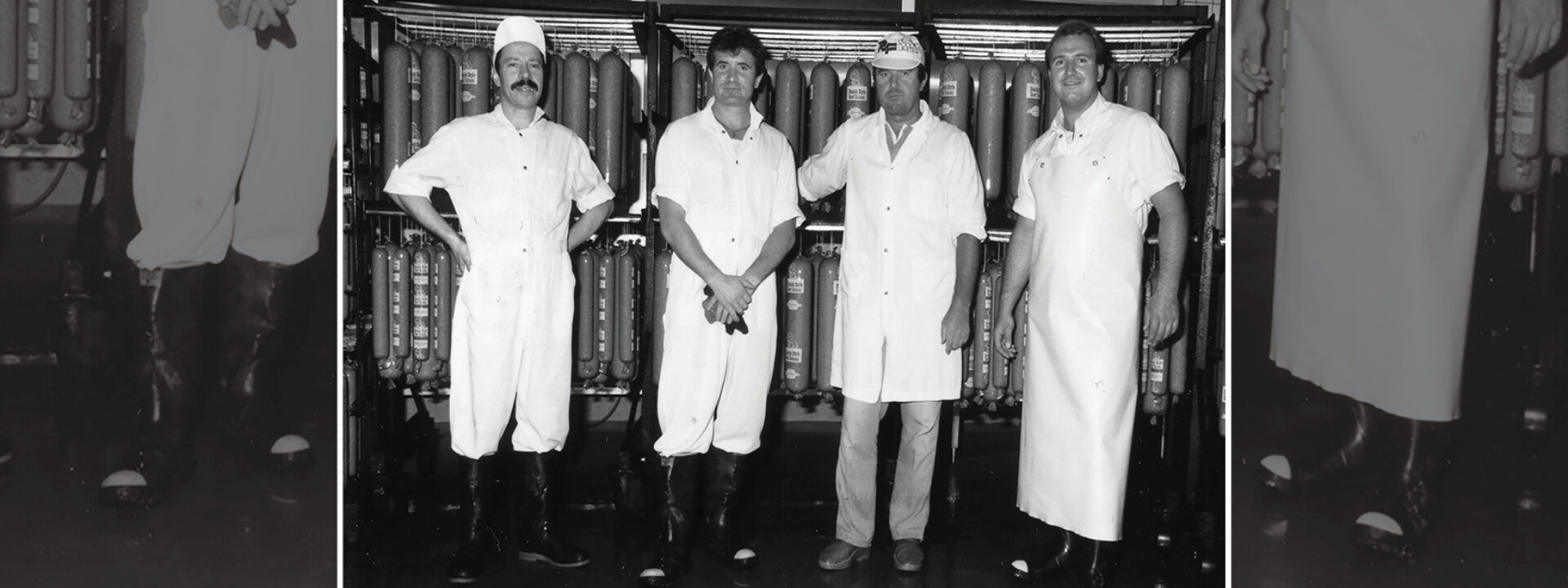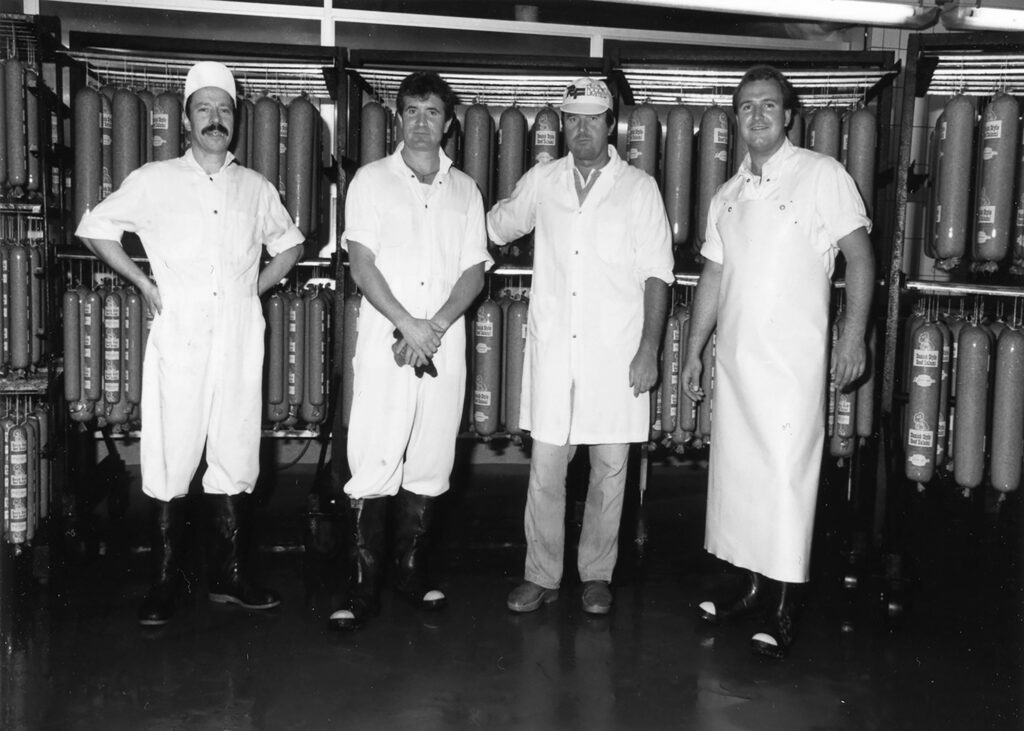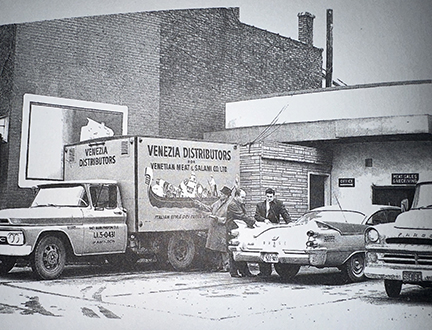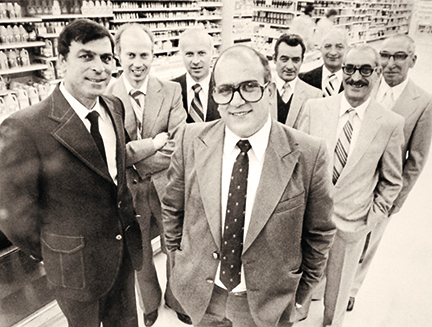Generations of fabulous food

These Hamilton-born food empires – all founded by immigrants who arrived in the post-war boom – are now iconic fixtures of this city’s past and present.
After World War II, many European families immigrated to Hamilton and broadened the city culturally. Statistically, one of the peak years for new arrivals was 1954. It was also a significant year for three families who brought recipes and knowledge that evolved into delicious, multi-generational food legacies.

The Denninger Family
Rudolph and Frieda Denninger opened their first Canadian store in 1954, just six months after arriving from Germany. A year later, they moved to 284 King St. E., which is now both a store and the corporate office in downtown Hamilton.
In the beginning, they lived above the store on the building’s second floor with their four children. In the basement, generations of family recipes were used to create delicious sausages, and both fresh and cured meats.
“Most immigrants brought some personal items along to Canada,” says Patrick Denninger, CEO. “My grandparents brought sausage-making equipment that helped to get the new business going.”
They also brought expertise gained from running three stores in Germany. Their eldest child had worked there and, though there was an age gap, over the years all four children worked in the King Street store.
This group of four siblings helped to expand the business to multiple locations. “My grandfather started the company but the growth really came from the second generation in its entirety who took it and built it from there,” says Denninger. Patrick’s father, Herman, spent more than 40 years as a butcher in the company.
“They always considered themselves a team,” adds Nathalie Coutayar, senior marketing manager. The company remains family-owned and operated and will celebrate its 70th anniversary this year.
Today there is a 60,000-square-foot plant that sends daily deliveries of freshly made meat products, ready-made meals, catering items and more to the downtown Hamilton store and four other locations: on Upper James, in Stoney Creek, Oakville, and Burlington which has a new design concept with licensed dining, classes and double the floor space of its predecessor.
Although much has changed over the years, the originality of the sausages and other meats remains the same. “All of those recipes came with them and are still used,” says Coutayar, “same care, same recipes.” Using only Canadian beef, and pork and chicken from Ontario, Denninger’s also prefers local suppliers for honey, maple syrup and other ingredients.
At the Hamilton Ticat games, Denninger’s sausages and hotdogs are a popular choice. In their stores, chicken schnitzel on a bun is the top choice of customers but the Big Rudi sandwich is a close second. That begs the question, with the corporate office right above the King Street store, do you pack a lunch or head down the stairs?
“Down the stairs,” replies Coutayar, without hesitation.
denningers.com

Venetian Meats & Salami Co.
Venetian Meats also began in 1954 with the talent and dedication of good friends, Gino Andreatta and Gino Dal Bello. Both had family roots in Italy, near Venice. Starting small, inside a backyard garage, they used traditional Italian methods and Dal Bello’s family recipes to make salami and other delicious meats.
In the early days, local retailers would not stock Venetian’s products, so Dal Bello began door-to-door sales, first by bicycle, and later by hearse.
“Yes, a hearse,” confirms his grandson and company vice-president Daniel Dorigiola. “And it was even equipped with a scale so orders could be weighed and invoiced on the spot.” Satisfied customers began telling their grocery stores to stock Venetian Meats – and so they did.
“He was very ambitious,” says Dorigiola, of his 23-year-old grandfather. “He borrowed about $2,500 from his father to start the business.” From the garage, the partners moved to new premises for one year before the landlord raised the rent too high. In 1957, they moved again, to 947 Burlington St., where Venetian Meats stayed until 2021.
Sadly, Andreatta died rather young, about 15 years after the company got going. It was a struggle for Dal Bello to run things on his own, but he worked very hard to make the business grow successfully and only slowed down as retirement drew near.
Dal Bello and his wife Maria raised their four children in Hamilton and all of them were involved in expanding the business. Today, two of those siblings, Dorigiola’s mother Anna Dorigiola and his uncle Valentino Dal Bello continue to work on a part-time basis.
Dorigiola and his cousin, Mark Dal Bello, took over ownership of the company three years ago. There are now 40 staff, including more family members, working at a two-year old custom-built facility in Stoney Creek.
The new location has a 38,000-square-foot manufacturing plant with huge drying rooms that can hold more than 27,000 pounds of salami. The corporate office is there and so is a very popular store.
“The current store is a big change from the old one,” says Dorigiola. “We showcase new products there and offer meals-to-go, sliced deli, dry goods, catering platters and specialty sandwiches, too.”
After seven decades, Venetian is still going strong with customers across Canada and the United States. Its meats are free of gluten, lactose and fillers, and the spices are still blended by hand, just like they were in that backyard garage.
venetianmeats.com

purchased by loblaw in 1988. Photo: Fortinos
Fortinos
John Fortino was 20 years old when he arrived in Hamilton in 1954. Today, a chain of 24 stores has his name but it all began humbly with one store back in 1961.
The first store was small, just 700 square feet, at King Street and Glendale Avenue. John was partners with his brothers-in-law, Stan Filice and Umberto Spagnuolo, who was the only full-time employee. Before long, they moved next door for more retail space.
During those early years, the three partners pooled resources and shared a house for their young and growing families. Later, when they all moved to homes on the Mountain, John believed the new neighbourhood was a good place for a store.
In 1972, with five more partners that included family and friends, a 5,000-square-foot Fortinos store opened on Upper Ottawa Street.
“His wife (Pileria) worked in that store, and I think maybe everybody in the family did too,” says Beverly Wright, director of marketing at parent company Loblaw.
“They were a hard-working immigrant family, and it was all-hands-on-deck when establishing the new business.”
Fortino’s nephew Vince Scorniaenchi was just 14 years old then. Many of the partners, like his father Tony, had their offspring helping in the new store but Scorniaenchi’s involvement started years before. During school holidays, he was picked up at 4 a.m. by Fortino to go buy fresh fruit and vegetables in Toronto. Riding in an old truck that needed cardboard sheets to cover holes in the floor, they’d be back and setting up displays by 9 a.m.
In 1988, with eight stores, Fortinos was purchased by Loblaw and John Fortino’s role shifted after that. Scorniaenchi took on the leadership role in 1994 and the company still operates very independently, with its own buyers, merchandisers, and offices.
Scorniaenchi calls Fortino a salt-of-the-earth-person who lived by honesty, modesty, and hard work.
“I saw that in him every day. It’s how he managed his business and I saw it as the right thing to do.” Scorniaenchi retired last year but says, “There’s a handful of direct descendants from the original owners still in the company.”
There have been many changes to the industry over the years and Fortino’s innovations were often imitated. Extensive produce areas, in-house bakeries and florists, and ready-made meals are some of their signature features. And after all these years, the emphasis is still on excellent food quality: “We’re all about fresh,” says Wright.
fortinos.ca
Other notable local food families
Corsini’s Supermarket
Josephine and Ennio Corsini opened their grocery store in 1928 at James and Murray streets. Not only a great place to buy food, the store also became a gathering place for the Italian community. The store ran for 60 years and often helped local families through hard times.
The Barn
George Love began working in his father’s downtown market stall when he was just nine. In 1970, he opened a produce stall of his own and Love’s first retail building came in 1983. There were seven Barn stores when A&P bought the business in 1999 and six more were added before Metro Inc. ended the brand in 2005.
Fearman’s Meats
Established in 1852 by Frederick Fearman on downtown MacNab Street, the company was known for its Star brand products which included hams, bacon, and lard. The business was family-owned until 1932, but the Fearman’s name trademark is still used today.






